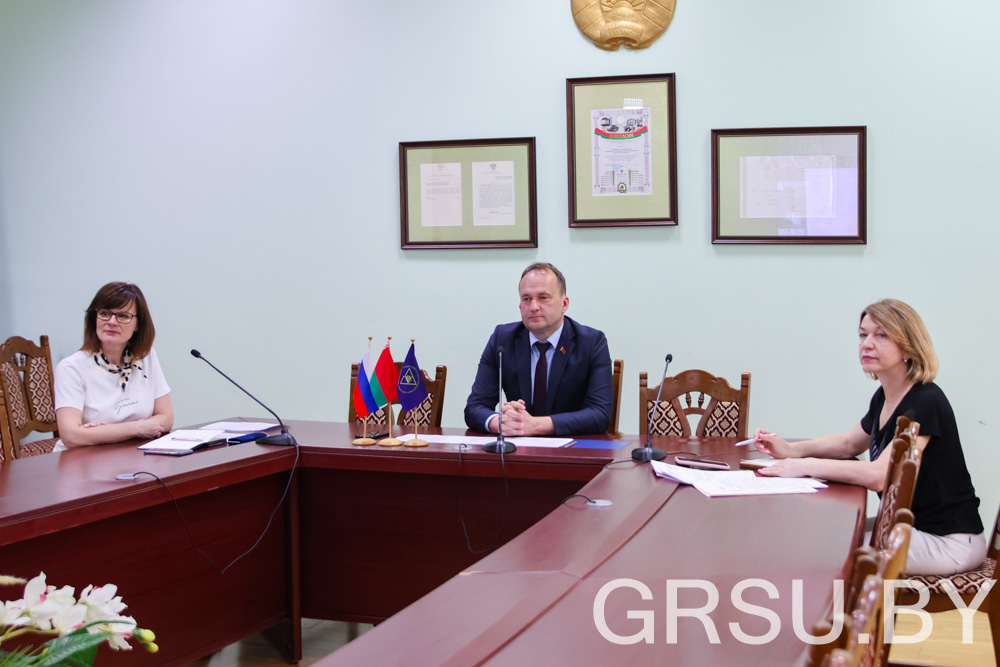Expanding the horizons of cooperation: Yanka Kupala State University of Grodno hosted an online meeting with representatives of the Belgorod University of Cooperation, Economics and Law

On July 7, an online meeting was held between representatives of Yanka Kupala State University of Grodno and colleagues from Belgorod University of Cooperation, Economics and Law. The event was dedicated to discussing promising cooperation in the field of education and science. This event was an important milestone in strengthening international relations and opening up new opportunities for students and teachers from both sides.
Belgorod University of Cooperation, Economics and Law was represented by Elizaveta Tarasova, First Vice-Rector for Research in charge of the International Department, Professor Natalia Kalavi, a leading specialist at the Center for International Cooperation, and Alina Dobrunova, a leading specialist at the Center for International Cooperation.
Aleksandr Karevskiy, First Vice-Rector of YKSUG, welcomed the representatives of Belgorod University of Cooperation, Economics and Law and introduced the participants of the online meeting. Among them are Elena Belokoz, Head of the Center for Internationalization of Education, and Olga Minova, Head of the International Cooperation Department.
Aleksandr Karevskiy invited the Russian side to get acquainted with Yanka Kupala State University of Grodno through a special video that vividly illustrated the life of the university, namely student events, achievements of teachers and students, as well as infrastructure, including modern laboratories and academic buildings. Thanks to this, representatives of the Belgorod University of Cooperation, Economics and Law gained a deeper understanding of the university's capabilities and resources, as well as got acquainted with its achievements in the field of education and research.
During the meeting, key issues related to future cooperation between Yanka Kupala State University of Grodno and Belgorod University of Cooperation, Economics and Law were discussed. One of the central points was the discussion of the possibility of implementing educational programs, which will allow students from both sides not only to exchange knowledge, but also to gain experience in different educational systems. One of the topics that aroused particular interest was the priority areas and specialties offered by each of the universities. The participants discussed how courses and programs can be integrated to provide students with access to a wide range of knowledge and skills needed in modern labor market conditions. This cooperation can include both traditional academic disciplines and innovative programs focused on current trends in economics and law. Academic exchanges, both face-to-face and online, have also become an important aspect of the discussion. The participants talked about the possibilities of creating programs that will allow students to study courses in different countries, which will significantly expand their horizons and improve intercultural communication. In addition, the topic of organizing joint conferences, seminars and summer schools was raised. The participants discussed which topics would be most relevant for joint events, including issues of sustainable development, innovative technologies in education, and legal aspects of economic cooperation. This will allow not only to share knowledge, but also to create a platform for scientific communication and collaboration.
Attention was also paid to the possibility of students' participation in events held within the framework of the UNESCO Associated Schools. This will provide an opportunity for students to immerse themselves in international educational standards and expand their knowledge of global issues. The topic of conducting scientific research in various fields occupied an important place in the discussion. The participants noted that joint research can become the basis for the creation of new scientific publications and projects, which in turn will improve the scientific image of both universities.
Finally, special attention was paid to the training of highly qualified scientific personnel. The participants discussed the need to create postgraduate and doctoral programs that will take into account modern requirements and challenges facing the scientific community. This will ensure not only the development of scientific potential, but also the training of highly qualified specialists for future generations.
The discussion of these issues was an important step towards creating a solid foundation for long-term cooperation between universities, opening up new horizons for students and teachers from both sides.






































